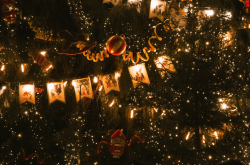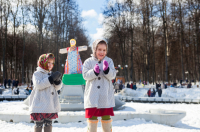A Spruce Was Born in the Forest / В лесу родилась ёлочка (circa 1903-1909)
Likely the oldest of Russian holiday classics, A Spruce Was Born… wasn’t a big hit right away. In fact, it even took several years to create. In 1903, the poetess Raisa Kudasheva wrote a poem simply titled Ёлка (“Spruce”). A few years later, the biologist and amateur musician Leonid Beckman, with the help of his pianist wife Elena Beckman-Shcherbina, decided to compose an accompanying melody as a birthday gift for their daughter. The sheet music was published to great acclaim – but not long after, World War I and the Russian Revolution, which resulted in a ban on Christmas celebrations, threw a wrench in the works.
It was only after the New Year (Novy God) was popularized in the mid-1930s that the tune gained a new life – and the rest is history. The secret of its appeal? The combination of a jaunty tune and easy-to learn, cutesy lyrics; you can check out a literary translation here.
The Little Fir Tree / Маленькой ёлочке холодно зимой (1935)
The song Маленькой елочке холодно зимой (whose full title translates to “The Little Fir Tree Is Cold in the Winter”) tells a story of a fir tree that feels lonely in the forest – until somebody takes it home to bring joy to children on New Year’s. No utrennik (children’s holiday matinee) goes without it! Usually, kids sing it while dancing a khorovod around the Christmas tree.
Everybody knows the words, but few can name the author. The song was written by Zinaida Alexandrova, a Soviet poet and translator, in the late 1930s. Even though the lyrics are pretty simple, they are masterfully put together, and are easy for children to understand and follow the tune. An absolute Russian New Year’s classic!
A Song About A Snowflake / Песенка о снежинке (1982)
“If the snowflake doesn’t melt in your hand, as the clock strikes twelve, the magic of New Year will grant your wish!” First appearing in the film musical Charodei (1982), it’s no wonder that the hopeful Песенка о снежинке ("A Song About A Snowflake") became a staple of any TV holiday concert. Its lyrics were written by Leonid Derbenyov, who authored many Russian and Soviet pop hits, including those performed by Alla Pugacheva and Muslim Magomayev. Over the years, it’s acquired quite a few festive renditions, including one featuring exclusively acoustic guitars.
If It Wasn’t For Winter / Кабы не было зимы (1984)
While the rest of the world hosts Harry Potter holiday marathons, if you were to turn on the TV around New Year’s in Russia, you’re more likely to stumble on Winter in Prostokvashino (1984). In this third animated installment about the trio from Prostokvashino – Uncle Fyodor (who is actually a little boy), his cat Matroskin, and dog Sharik – the characters come together in the village of Prostokvashino for winter holidays. Кабы не было зимы (If It Wasn’t For Winter) (1984) is sung by Uncle Fyodor’s mom when she makes a surprise visit to the village. The song itself was written by the renowned Russian composer Yevgeny Krylatov and lyricist Yury Entin, who have forged the childhood of many Russian and Soviet kids with their fun, whimsical, sing-along creations.
New Year’s Song / Новогодняя (1999)
Looking back at what Russians listen to on New Year’s Eve, it may seem that all the gems hail from the Soviet era, with modernity contributing little to the playlist. However, Новогодняя by the dance-pop band Diskoteka Avariya is one of many exceptions to this theory. The track about anticipating the New Year and calling up Ded Moroz is something no millennial party can go without – perhaps because it’s perfect for dancing and singing (or rapping) along. Released almost 25 years ago to celebrate the new millennium, it still feels like a fresh staple of festive music.
ITMO.NEWS Editorial team



